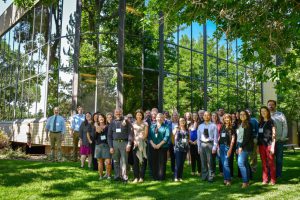- Year Published : 2022
- Month Published : August
Community of Practice to Build on Existing Work Examining the Impacts of
Administrative Holds on College Students

BOULDER, Colorado – Twelve postsecondary institutions within the Western Interstate Commission for Higher Education (WICHE) region have been selected to participate in a community of practice to learn how to collect, clean, and analyze their data to better understand the impact that administrative hold policies and practices have on student success.
An administrative hold is a type of restriction imposed on students by their college or university for reasons such as overdue debts or missing library books and may prevent a student from accessing services or transcripts, registering for future classes, or matriculating on time. While most holds are resolved, some research indicates they may disproportionately affect first-generation students, students of color, and students from low-income backgrounds.
“Carrying out WICHE’s mission to serve students in the West starts with understanding their experiences and where there may be roadblocks to their success in higher education,” said Dr. Sarah Leibrandt, director of academic leadership initiatives at WICHE and the project lead/principal investigator. “The community of practice model will allow teams from these institutions to work within and across institutions to understand the effects of administrative and student success holds and ensure their holds policies are student-centric.”
The community of practice is called No Holding Back, and the 12 postsecondary institutions selected to participate include California State University Fullerton, Central Washington University, Eastern Oregon University, Flathead Valley Community College (Montana), Great Basin College (Nevada), Idaho State University, Laramie County Community College (Wyoming), Portland State University (Oregon), University of Alaska Southeast, University of Arizona, University of Guam, and University of Nevada, Las Vegas. Earlier this month, administrative leaders, registrars, bursars, enrollment specialists, directors of information technology and institutional research from these institutions gathered at WICHE’s offices in Boulder, Colorado, to set project goals and to participate in technical trainings.
“Idaho State University plans to include students in the project data analysis and learn how student holds have impacted their collegiate journey,” said Dr. Staci Phelan, associate vice president for enrollment management at Idaho State University. “Student feedback is key to developing strategies that reduce barriers to college completion.”
The No Holding Back community of practice represents 10 states and territories in the West, seven institutions that have 30% or more Pell Grant recipients, five institutions with a status as a Minority-Serving Institution, and three institutions serving community college students. It also includes institutions serving between 1,500 and 40,000 degree-seeking undergraduates each year, institutions in both rural and urban areas, and institutions that use student information systems like Banner, PeopleSoft, colleague, and CAMS Enterprise SIS. Students may interact with these platforms through the admissions process, course registration process, to pay tuition and fees, or to access grades and transcripts.
“The WICHE project on student success hold policies are beneficial to the institutions as it is relatable,” said Elsa Caguin Flores, associate comptroller/bursar, University of Guam. “Our primary goal is to improve our hold policy processes to be consistent with all departments and to better serve the student population.”
The WICHE project will last 18 months and collaboratively builds on existing work by the American Association of Collegiate Registrars and Admissions Officers (AACRAO) and is funded by grants from Lumina Foundation and Ascendium Education Group. Ultimately, the goal is to develop a technical handbook, tools, webinars, and a comprehensive report on the findings to enable other institutions to replicate this work. Learn more at www.wiche.edu/key-initiatives/no-holding-back.
____________
About WICHE
Since 1953, the Western Interstate Commission for Higher Education has been strengthening higher education, workforce development, and behavioral health throughout the region. From promoting high-quality, affordable postsecondary education to helping states get the most from their technology investments and addressing behavioral health challenges, WICHE improves lives across the West through innovation, cooperation, resource sharing, and sound public policy. WICHE members include Alaska, Arizona, California, Colorado, Hawai’i, Idaho, Montana, Nevada, New Mexico, North Dakota, Oregon, South Dakota, Utah, Washington, Wyoming, and the U.S. Pacific Territories and Freely Associated States (the Commonwealth of the Northern Mariana Islands, Guam, the Republic of the Marshall Islands, the Federated States of Micronesia, and the Republic of Palau).
###
